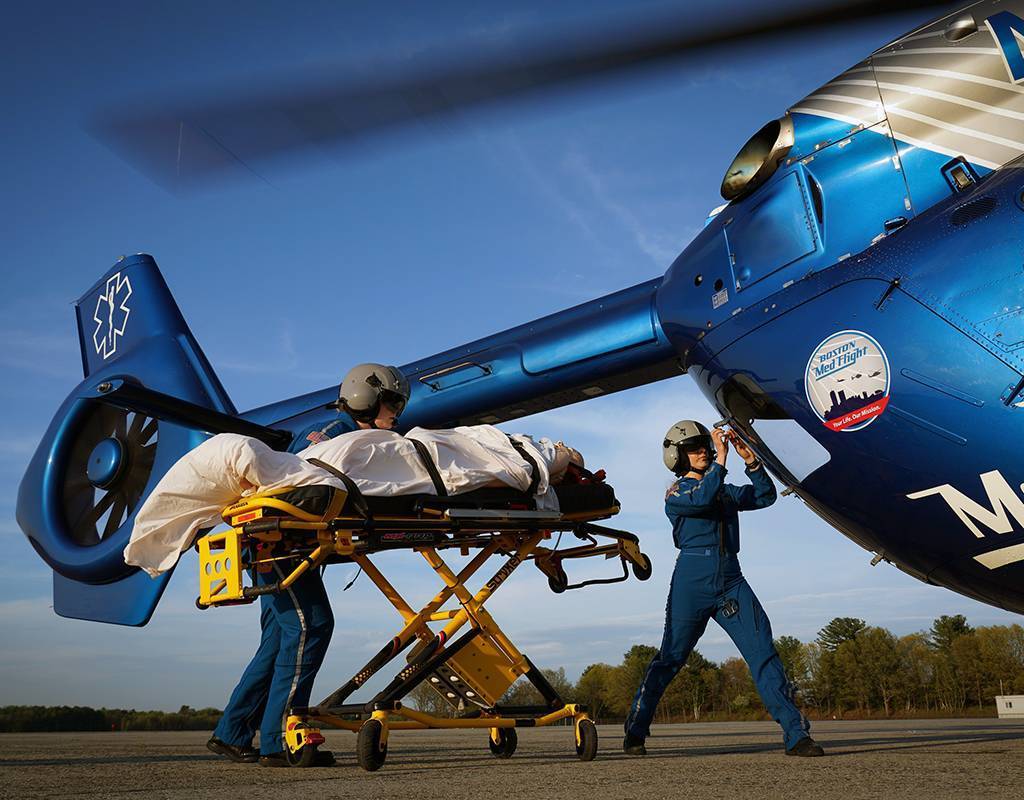
Transporting patients who are or may be infected with the novel coronavirus has in some cases tripled the duration of helicopter EMS missions, which is taking a toll on Boston MedFlight pilots and crews.
The Boston, Massachusetts area is in the midst of what officials think is peak transmission of the virus, but the hospital system has not seen an overwhelming surge in patients, said Rick Kenin, Boston MedFlight’s chief operating officer for transit.

Advertisement
So far, the air ambulance operation has not been overstretched, though individual patient transports are taking much longer, Kenin told Vertical in a recent interview. A typical patient transport from dispatch to return to service takes between 90 and 120 minutes, he said. Covid-19 transports are now taking four-and-a-half hours because of the precautions that must be taken not to spread the virus.
“The biggest difference we see is the length of the transport process,” he said. “These are very complex patients. Then you have to decontaminate the aircraft using chemicals after each flight. There is donning and doffing of PPE [personal protective equipment] for pilots and crew. That whole process to get ready for a flight and then turn around the aircraft takes a whole lot more time.”
The company is a member of the Northeast Air Alliance, an information-sharing and mutual aid organization of helicopter air ambulance providers from eastern New York to Maine. The non-profit critical care transport company operates fixed- and rotary-wing aircraft and ground ambulances for a consortium of seven hospitals.
Since the virus began spreading in the region, MedFlight has been able to cover all of the necessary flight transport requests with its fleet of four Airbus H145s and one backup EC145. On a normal day, the company would fly 12 or 15 patients suffering from a whole spectrum of traumas from car accidents to heart attacks.
Every Boston MedFlight patient is cared for by a critical care nurse and paramedic, and every vehicle in its fleet is equipped to serve as a mobile intensive care unit.
In all, Boston MedFlight has moved about 275 Covid-positive patients, of which 15 were moved by helicopter. As with most air ambulance operators, MedFlight is transporting infected or suspected Covid patients by ground ambulance because those vehicles are easier to sterilize and the driver compartment is sealed from the patient compartment in the back. It is more difficult and sometimes impossible to segregate a helicopter cockpit from the cabin.
All 15 of those patients moved by helicopter were taken from either Martha’s Vineyard or Nantucket. Remote and accessible by boat in normal times, the islands are effectively cut off from the mainland during the ongoing pandemic lockdown, he said.
Advertisement
Though Covid-19 cases have spiked in the region, there has been a corresponding “dramatic decrease” in overall transport load because community hospitals are keeping patients in house to avoid overloading major metropolitan medical centers, he said.
Still, the pandemic is placing unique stress on pilots and crews that have to spend more time in the aircraft during calls, witness patients with critical respiratory distress and are flying missions under the ever-present threat of contracting a highly contagious pathogen.
“The limiting factor is always staff,” he said. “This is proving to be tremendously stressful for our teams. The volume is down, so pilots are not feeling it as much as nurses and paramedics, but it inevitably rolls over to our crews.”
MedFlight at first could not use the environmental control system (ECS) in flight, meaning crews did not have either heat or air conditioning because the recirculated air was not filtered and could aid in spreading virus particles. Airbus stepped up and helped develop and rush through certification a HEPA filter for the 145’s ECS that allows crews the comfort of air conditioning, which will become more important when the weather warms, he said.
“The certification management team bent over backwards, because for a while we were not flying with the ECS,” he said. “We were able to get verbal approved in something like eight hours. Airbus has been doing a lot of things to help us out.”



